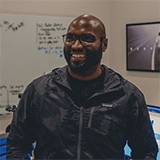.jpg)
For Samantha Tseng, 2020 was a year of changes. She had been working in marketing and freelancing for local companies for about five years when COVID-19 left her underemployed.
“Initially, when the pandemic hit and the economy shut down, I went to my place of comfort and just tried to keep job searching,” she says. “But when I couldn’t find opportunities for intermediate professionals such as myself that have been in the industry for only 5 years — not quite an intern, not quite an executive — I was like, ‘Okay, I need to create my own opportunity.’”

She felt the push to go remote and digital, so she signed up for Fiverr.
“I think the reason why it happened the way it did, ultimately, is because the pandemic forced me into a circumstance when I had to consider alternatives that if the pandemic weren’t present, I would be like, ‘Oh no, I can’t do that, it’s too risky,’” she says. “But when you’re underemployed and the economy is shut down, it’s like, if you want to make it and you want to achieve your goals, you have to do unconventional things.”
Clients loved her marketing work. Soon, she was getting bigger projects and requests to include copywriting with her services. After only five or six months on the platform, she received a request to work with Mercedes-Benz.
Initially overwhelmed by the opportunity, Samantha tried to treat them just like any other client. After all, she says, big people, big companies, they’re just people at the end of the day.
“And I think forcing yourself into that mode helps you handle those situations better because it’s easy to get overwhelmed or to overthink about, how prestigious is this? Am I worthy of this, can I handle this?” she says. “But once you acknowledge everyone’s on the same playing field, everyone’s equal, those feelings start to subside and then helping those people is a lot easier.”
That said, she does recommend choosing the jobs you take carefully. You attract what you put out, she says. If you’re only working with clients that want or produce low-quality work, your samples won’t reflect you very well. You’ll also only be able to attract clients at the same level.
“I realized I have to find people like me, who are really serious about their business and doing something very purposeful, which makes them more accountable for their vision,” Samantha says. “It’s gonna make them want to do the right things to move forward. And when I work for those people and I do work for them, it’s always high-quality."
Quality isn’t the only thing freelancers should consider. If you want to turn your passion into a profitable business, you should start with self-reflection.
“I think it begins with first knowing yourself. Knowing what you like and what you don’t like because there are a lot of pressures out there that will tell you to not be true to yourself,” she says. “But you need to stick with what you like to do because if you don’t, long-term, you’re probably going to give up, you’re probably going to get overwhelmed and you’re not going to want to do it.”
Next, you have to find your audience, identifying the people you most want to work with.
“Figure out who in the world needs what you want to do,” she says. “Throw away your preconceptions of, ‘How realistic is this?’ and think about, what is your passion, who needs it? Because the people who need it will compensate you well for it. And odds are they will come back over and over again for that thing.”
But that’s not all. If you want to enjoy a long-term freelance career, there’s one last thing to consider.
“And then, one step further, why do you do what you do? What’s the transformation that you’re giving these people? Because just the passion for what you do in and of itself can be enough. And your audience can be enough too,” Samantha says. “But if you’re passionate about the end result, it’s just one more thing that will fasten you to that freelance or business choice and help you stick to it.”
For Samantha, empowering disempowered communities through social justice efforts is the passion that brings purpose to her freelancing work.
“For me, I love social justice. So writing, which is what I love, and helping entrepreneurs that care about social justice is also what I love, but also creating real results that affect the movement, that affect the people and make their lives better,” she says. “All three of these prongs make me really happy and enjoy what I do and that’s why I don’t see myself quitting anytime soon because I have those three different reinforcements that keep me happy in doing what I do.”
Hear the full story on this week’s episode, along with a peek at the secrets of Samantha’s success, how to become an expert in under a year, and what she has planned for 2021.
You can Samantha online at samanthatseng.com or on social media by following the links at the bottom of her website.
